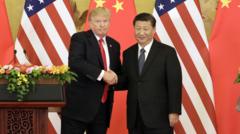With tariffs escalating and economies contracting, US and China trade officials are set to meet in Switzerland for discussions aimed at de-escalating tensions. As both sides seek to reassure nervous markets, the meetings promise to open channels for future negotiations despite the complexity of their trade relationship.
US and China Initiate Talks to Ease Long-standing Trade Tensions

US and China Initiate Talks to Ease Long-standing Trade Tensions
High-stakes negotiations between the US and China in Switzerland mark a potential turning point in a two-year trade war, as both nations respond to domestic pressures and increasing economic strain.
Despite ongoing tensions and a series of retaliatory tariffs, the United States and China are finally opening a dialogue in Switzerland to address their long-standing trade disputes. The upcoming meeting marks the first high-level encounter since tariffs were imposed by the Trump administration in early January, which saw US tariffs on Chinese imports surge to 145% and duties on US exports to China reach 125%.
The atmosphere leading up to this meeting has been fraught with combative rhetoric from both nations. Analysts suggest that the timing indicates both sides are eager to re-engage without appearing to capitulate to the other. Stephen Olson, a senior visiting fellow at Singapore's ISEAS-Yusof Ishak Institute, highlighted this dilemma: "Neither side wants to appear to be backing down."
China's foreign ministry insists the talks were initiated at the request of the US, framing their participation as a favor to American businesses and consumers. However, the Trump administration has countered this narrative, suggesting it is China that is in dire need of negotiations due to economic strain.
As the talks loom, President Trump attempts to downplay the blame game, focusing instead on achieving meaningful outcomes in Geneva. Coincidentally, this diplomatic effort coincides with Chinese President Xi Jinping's visit to Moscow, reinforcing China's position as an alternative global leader amid rising tensions with the US.
Both nations are motivated to negotiate as tariffs have begun to take their toll on their economies. Reports indicate that Chinese manufacturing activity has dropped, demonstrating the impact of imposed tariffs. Conversely, US industry sectors reliant on Chinese imports are also faltering, with concerns about supply chain disruptions rising significantly.
The upcoming discussions in Geneva are anticipated to be exploratory, primarily aimed at exchanging positions rather than reaching immediate resolutions. Experts suggest that meaningful agreements may be a long way off, reminding observers that typical negotiations could take months to yield results. Any deal that could emerge from these conversations is theorized to resemble a "phase one deal on steroids," targeting more complex issues than previous agreements.
As the meeting unfolds, both sides face mounting political and economic pressures to provide reassurance to their respective markets and constituents, indicating that a cautious approach will characterize the proceedings. Ultimately, the extent to which these talks may reshape the contentious US-China trade landscape remains uncertain, though the path forward appears to be riddled with challenges.
The atmosphere leading up to this meeting has been fraught with combative rhetoric from both nations. Analysts suggest that the timing indicates both sides are eager to re-engage without appearing to capitulate to the other. Stephen Olson, a senior visiting fellow at Singapore's ISEAS-Yusof Ishak Institute, highlighted this dilemma: "Neither side wants to appear to be backing down."
China's foreign ministry insists the talks were initiated at the request of the US, framing their participation as a favor to American businesses and consumers. However, the Trump administration has countered this narrative, suggesting it is China that is in dire need of negotiations due to economic strain.
As the talks loom, President Trump attempts to downplay the blame game, focusing instead on achieving meaningful outcomes in Geneva. Coincidentally, this diplomatic effort coincides with Chinese President Xi Jinping's visit to Moscow, reinforcing China's position as an alternative global leader amid rising tensions with the US.
Both nations are motivated to negotiate as tariffs have begun to take their toll on their economies. Reports indicate that Chinese manufacturing activity has dropped, demonstrating the impact of imposed tariffs. Conversely, US industry sectors reliant on Chinese imports are also faltering, with concerns about supply chain disruptions rising significantly.
The upcoming discussions in Geneva are anticipated to be exploratory, primarily aimed at exchanging positions rather than reaching immediate resolutions. Experts suggest that meaningful agreements may be a long way off, reminding observers that typical negotiations could take months to yield results. Any deal that could emerge from these conversations is theorized to resemble a "phase one deal on steroids," targeting more complex issues than previous agreements.
As the meeting unfolds, both sides face mounting political and economic pressures to provide reassurance to their respective markets and constituents, indicating that a cautious approach will characterize the proceedings. Ultimately, the extent to which these talks may reshape the contentious US-China trade landscape remains uncertain, though the path forward appears to be riddled with challenges.






















